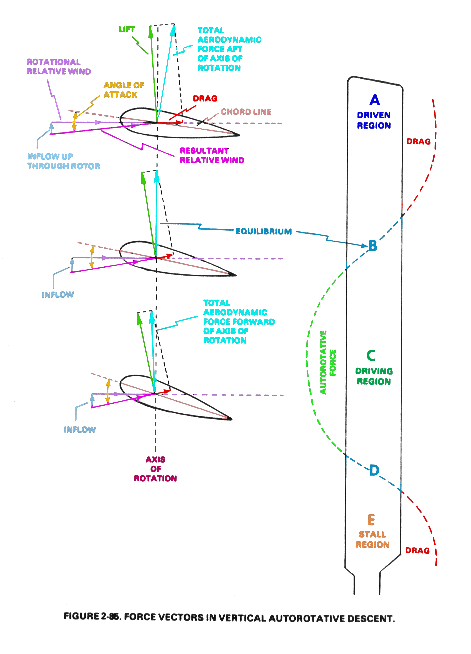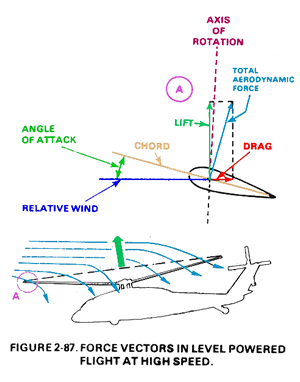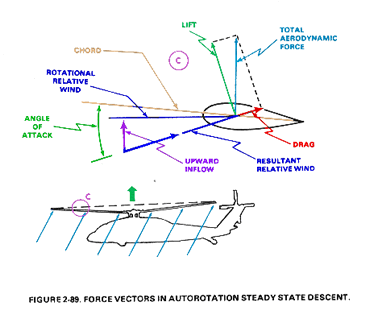
aerodynamics of autorotationDuring powered flight, the rotor drag is overcome with engine
power. When the engine fails, or is deliberately disengaged from the rotor
system, some other force must be used to sustain rotor RPM so controlled flight
can be continued to the ground. This force is generated by adjusting the
collective pitch to allow a controlled descent. Airflow during helicopter
descent provides the energy to overcome blade drag and turn the rotor. When the
helicopter is descending in this manner, it is said to be in a state of
autorotation. In effect the pilot gives up altitude at a controlled rate in
return for energy to turn the rotor at an RPM which provides aircraft control.
Stated another way, the helicopter has potential energy by virtue of its
altitude. As altitude decreases, potential energy is converted to kinetic energy
and stored in the turning rotor. The pilot uses this kinetic energy to cushion
the touchdown when near the ground.
Most autorotations are performed with forward airspeed. For
simplicity, the following aerodynamic explanation is based on a vertical
autorotative descent (no forward airspeed) in still air. Under these conditions,
the forces that cause the blades to turn are similar for all blades regardless
of their position in the plane of rotation. Dissymmetry of lift resulting from
helicopter airspeed is therefore not a factor, but will be discussed later.
During vertical autorotation, the rotor disk is divided into
three regions:

-
The driven region, also called the propeller
region, is nearest to the blade tips and normally consists of about 30
percent of the radius. The total aerodynamic force in this region is inclined
slightly behind the rotating axis. This results in a drag force which tends to
slow the rotation fo the blade.
-
The driving region or autorotative region,
normally lies between about 25 to 70 percent of the blade radius. Total
aerodynamic force in this region is inclined slightly forward of the axis of
rotation. This inclination supplies thrust which tends to accelerate the
rotation of the blade.
-
The stall region includes the inboard 25 percent of
the blade radius. It operates above the stall angle of attack and causes drag
which tends to slow the rotation of the blade.
The following figure shows three blade sections that
illustrate force vectors in the driven region "A", a region of equilibrium "B"
and the driving region "C":

The force vectors are different in each region, because the
rotational relative wind is slower near the blade root and increases continually
toward the blade tip. When the inflow up through the rotor combines with
rotational relative wind, it produces different combinations of aerodynamic
force at every point along the blade.
In the driven region, the total aerodynamic force acts behind
the axis of rotation, resulting in an overall dragging force. This area produces
lift but it also opposes rotation and continually tends to decelerate the blade.
The size of this region varies with blade pitch setting, rate of descent, and
rotor RPM. When the pilot takes action to change autorotative RPM, blade pitch,
or rate of descent, he is in effect changing the size of the driven region in
relation to the other regions.
Between the driven region and the driving region is a point
of equilibrium. At this point on the blade, total aerodynamic force is aligned
with the axis of rotation. Lift and drag are produced, but the total effect
produces neither acceleration nor deceleration of the rotor RPM. Point "D" is
also an area of equilibrium in regard to thrust and drag.
Area "C" is the driving region of the blade and produces the
forces needed to turn the blades during autorotation. Total aerodynamic force in
the driving region is inclined forward of the axis of rotation and produces a
continual acceleration force. Driving region size varies with blade pitch
setting, rate of descent and rotor RPM. The pilot controls the size of this
region in relation to the driven and stall regions in order to adjust
autorotative RPM. For example, if the collective pitch stick is raised, the
pitch angle will increase in all regions. This causes the point of equilibrium
"B" to move toward the blade tip, decreasing the size of the driven region. The
entire driving region also moves toward the blade tip. The stall region becomes
larger and the total blade drag is increased, causing RPM decrease.
A constant rotor RPM is achieved by adjusting the collective
pitch control so blade acceleration forces from the driving region are balanced
with the deceleration forces from the driven and stall regions.
Aerodynamics of autorotation in forward flight
Autorotative force in forward flight is produced in exactly
the same manner as when the helicopter is descending vertically in still air.
However, because forward speed changes the inflow of air up through the rotor
disk, the driving region and stall region move toward the retreating side of the
disk where angle of attack is larger:

Because of lower angles of attack on the advancing side
blade, more of that blade falls into the driven region. On the retreating side
blade, more of the blade is in the stall region, and a small section near the
root experiences a reversed flow. The size of the driven region on the
retreating side is reduced.
Autorotations may be divided into three distinct phases; the
entry, the steady state descent, and the deceleration and
touchdown. Each of these phases is aerodynamically different than the
others. The following discussion describes forces pertinent to each phase.
Entry into autorotation is performed following loss of
engine power. Immediate indications of power loss are rotor RPM decay and an
out-of-trim condition. Rate of RPM decay is most rapid when the helicopter is at
high collective pitch settings. In most helicopters it takes only seconds for
the RPM decay to reach a minimum safe range. Pilots must react quickly and
initiate a reduction in collective pitch that will prevent excessive RPM decay.
A cyclic flare will help prevent excessive decay if the failure occurs at thigh
speed. This technique varies with the model helicopter. Pilots should consult
and follow the appropriate aircraft Operator's Manual.
The following figure shows the airflow and force vectors for
a blade in powered flight at high speed:

Note that the lift and drag vectors are large and the total
aerodynamic force is inclined well to the rear of the axis of rotation. If the
engine stops when the helicopter is in this condition, rotor RPM decay is rapid.
To prevent RPM decay, the pilot must promptly lower the collective pitch control
to reduce drag and incline the total aerodynamic force vector forward so it is
near the axis of rotation.
The following figure shows the airflow and force vectors for
a helicopter just after power loss:

The collective pitch has been reduced, but the helicopter has
not started to descend. Note that lift and drag are reduced and the total
aerodynamic force vector is inclined further forward than it was in powered
flight. As the helicopter begins to descend, the airflow changes. This causes
the total aerodynamic force to incline further forward. It will reach an
equilibrium that maintains a safe operating RPM. The pilot establishes a glide
at the proper airspeed which is 50 to 75 knots, depending on the helicopter and
its gross weight. Rotor RPM should be stabilized at autorotative RPM which is
normally a few turns higher than normal operating RPM.
The following figure shows the helicopter in a steady
state descent:

Airflow is now upward through the rotor disk due the descent.
Changed airflow creates a larger angle of attack although blade pitch angle is
the same as it was in the previous picture, before the descent began. Total
aerodynamic force is increased and inclined forward so equilibrium is
established. Rate of descent and RPM are stabilized, and the helicopter is
descending at a constant angle. Angle of descent is normally 17 degrees to 20
degrees, depending on airspeed, density altitude, wind, the particular
helicopter design, and other variables.
The following figure illustrates the aerodynamics of
autorotative deceleration:

To successfully perform an autorotative landing, the pilot
must reduce airspeed and rate of descent just before touchdown. Both of these
actions can be partially accomplished by moving the cyclic control to the rear
and changing the attitude of the rotor disk with relation to the relative wind.
The attitude change inclines the total force of the rotor disk to the rear and
slows forward speed. It also increases angle of attack on all blades by changing
the inflow of air. As a result, total rotor lifting force is increased and rate
of descent is reduced. RPM also increases when the total aerodynamic force
vector is lengthened, thereby increasing blade kinetic energy available to
cushion the touchdown. After forward speed is reduced to a safe landing speed,
the helicopter is placed in a landing attitude as collective pitch is applied to
cushion the touchdown.
|
